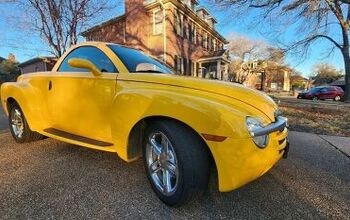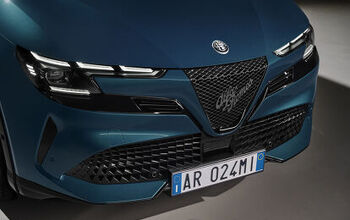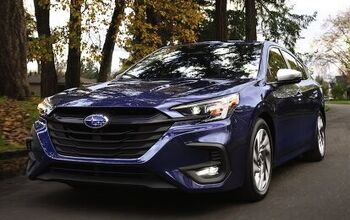Old Hat: European Sale of Diesel Cars Overtaken by Gasoline for the First Time Since 2009

Diesel-powered passenger vehicle sales have fallen in Europe. Data from the European Automobile Manufacturers Association (ACEA) showed diesel’s year-over-year market share plummeting in the first half of 2017, sinking from 50.2 percent to 46.3 percent of all new car registrations in the EU.
Helped by negative publicity and governmental intervention, it’s the first time diesels have dipped below the 50 percent mark since 2009. ACEA’s figures indicate 152,323 fewer diesel cars sold so far in 2017, attributing some of the decline to a renewed interest in gasoline-powered vehicles. Of course, if you aren’t buying diesel, you don’t have a lot of other options.
Still, deliveries of “alternative” vehicles — which include hybrid, electric, and natural gas-powered automobiles — also rose by more than 35 percent. Those categories now account for 5.2 percent of Europe’s total auto sales.
It’s not terribly surprising. With most German automakers involved in some kind of of diesel emissions investigation over the last few years, the fuel’s image has taken a major PR hit. Meanwhile, electrically-driven cars have been praised as the green solution we’ve all been waiting for.
Hoping to encourage the change, much of Europe has implemented tax breaks for EV adopters. While this is also a common practice in North America, some European countries are taking things a step further with proposed timelines that would essentially ban all sales of internal combustion vehicles by 2040.
France has also been attempting to strip longstanding incentives from diesel sales and Paris has a plan to prohibit diesel-powered cars from entering the city by 2025. Other cities have proposed similar solutions to air quality issues in urban areas.
Despite its large population, Germany is one of the few countries dragging its feet. While its government has proposed similar bans, support for those initiatives remains limited — possibly because of the country’s strong connection to the automotive industry.
While the European shift away from diesels is likely to to reduce soot and NOx emissions from its atmosphere, ACEA warned that more gasoline engines could make it difficult for the region to meet CO2 reduction targets. “Policy makers need to be aware that a sudden shift from diesel technology to petrol will lead to an increase in CO2 emissions, given that the market penetration of alternative powertrains remains low,” explained ACEA secretary general Erik Jonnaert.
“Alternative powertrains will undoubtedly play an increasing role in the transport mix, and all European manufacturers are investing heavily in them,” Jonnaert said in a statement. “To this end, more needs to be done to encourage consumers to buy alternatively-powered vehicles, for instance by putting in place the right incentives and deploying recharging infrastructure across the EU.”
“In the meantime, however, as diesel cars emit significantly less CO2 than equivalent petrol-powered vehicles, they will have to be part of the gradual transition to low-carbon vehicles, acting as a ‘bridge’ technology.

A staunch consumer advocate tracking industry trends and regulation. Before joining TTAC, Matt spent a decade working for marketing and research firms based in NYC. Clients included several of the world’s largest automakers, global tire brands, and aftermarket part suppliers. Dissatisfied with the corporate world and resentful of having to wear suits everyday, he pivoted to writing about cars. Since then, that man has become an ardent supporter of the right-to-repair movement, been interviewed on the auto industry by national radio broadcasts, driven more rental cars than anyone ever should, participated in amateur rallying events, and received the requisite minimum training as sanctioned by the SCCA. Handy with a wrench, Matt grew up surrounded by Detroit auto workers and managed to get a pizza delivery job before he was legally eligible. He later found himself driving box trucks through Manhattan, guaranteeing future sympathy for actual truckers. He continues to conduct research pertaining to the automotive sector as an independent contractor and has since moved back to his native Michigan, closer to where the cars are born. A contrarian, Matt claims to prefer understeer — stating that front and all-wheel drive vehicles cater best to his driving style.
More by Matt Posky
Latest Car Reviews
Read moreLatest Product Reviews
Read moreRecent Comments
- Kwik_Shift_Pro4X Thankfully I don't have to deal with GDI issues in my Frontier. These cleaners should do well for me if I win.
- Theflyersfan Serious answer time...Honda used to stand for excellence in auto engineering. Their first main claim to fame was the CVCC (we don't need a catalytic converter!) engine and it sent from there. Their suspensions, their VTEC engines, slick manual transmissions, even a stowing minivan seat, all theirs. But I think they've been coasting a bit lately. Yes, the Civic Type-R has a powerful small engine, but the Honda of old would have found a way to get more revs out of it and make it feel like an i-VTEC engine of old instead of any old turbo engine that can be found in a multitude of performance small cars. Their 1.5L turbo-4...well...have they ever figured out the oil dilution problems? Very un-Honda-like. Paint issues that still linger. Cheaper feeling interior trim. All things that fly in the face of what Honda once was. The only thing that they seem to have kept have been the sales staff that treat you with utter contempt for daring to walk into their inner sanctum and wanting a deal on something that isn't a bare-bones CR-V. So Honda, beat the rest of your Japanese and Korean rivals, and plug-in hybridize everything. If you want a relatively (in an engineering way) easy way to get ahead of the curve, raise the CAFE score, and have a major point to advertise, and be able to sell to those who can't plug in easily, sell them on something that will get, for example, 35% better mileage, plug in when you get a chance, and drives like a Honda. Bring back some of the engineering skills that Honda once stood for. And then start introducing a portfolio of EVs once people are more comfortable with the idea of plugging in. People seeing that they can easily use an EV for their daily errands with the gas engine never starting will eventually sell them on a future EV because that range anxiety will be lessened. The all EV leap is still a bridge too far, especially as recent sales numbers have shown. Baby steps. That's how you win people over.
- Theflyersfan If this saves (or delays) an expensive carbon brushing off of the valves down the road, I'll take a case. I understand that can be a very expensive bit of scheduled maintenance.
- Zipper69 A Mini should have 2 doors and 4 cylinders and tires the size of dinner plates.All else is puffery.
- Theflyersfan Just in time for the weekend!!! Usual suspects A: All EVs are evil golf carts, spewing nothing but virtue signaling about saving the earth, all the while hacking the limbs off of small kids in Africa, money losing pits of despair that no buyer would ever need and anyone that buys one is a raging moron with no brains and the automakers who make them want to go bankrupt.(Source: all of the comments on every EV article here posted over the years)Usual suspects B: All EVs are powered by unicorns and lollypops with no pollution, drive like dreams, all drivers don't mind stopping for hours on end, eating trays of fast food at every rest stop waiting for charges, save the world by using no gas and batteries are friendly to everyone, bugs included. Everyone should torch their ICE cars now and buy a Tesla or Bolt post haste.(Source: all of the comments on every EV article here posted over the years)Or those in the middle: Maybe one of these days, when the charging infrastructure is better, or there are more options that don't cost as much, one will be considered as part of a rational decision based on driving needs, purchasing costs environmental impact, total cost of ownership, and ease of charging.(Source: many on this site who don't jump on TTAC the split second an EV article appears and lives to trash everyone who is a fan of EVs.)


































Comments
Join the conversation
The Germans are really worried about the likes of Tesla, and they are also are getting flak from the environmentalists for said foot dragging. Prost!
I'm not gonna tell Europe what to do or anything but their extremely high "fuel tax" still heavily subsidizes sales of new diesel autos. There's no real need to ban diesels. Diesel autos aren't the rational choice, all things equal, for everyday passenger cars anyway. And it's not like F-series would dominate the Euro landscape with US type fuel prices/taxes or anything. But it'd be hilarious if they did.